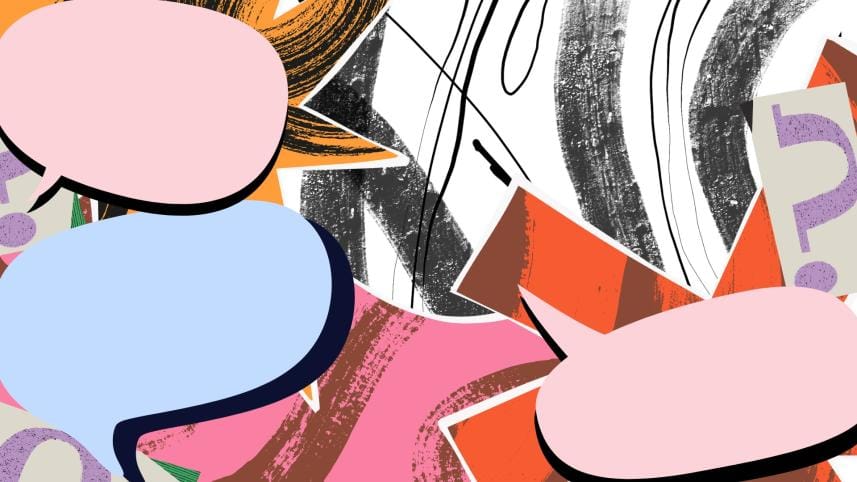Are the wonders of our everyday conversations withering away?

I recently ran into an old friend on campus, and we immediately launched into an enthusiastic back-and-forth. It had been nearly two years since we last spoke. There was a lot to share. For fifteen solid minutes, we hurled questions at each other – rapid-fire, curious, animated. Both of us kept jumping from one topic to another, like we were trying to cram two years' worth of life events within a quarter of an hour.
At one point, she mentioned that she had been struggling with a particularly difficult course that semester, to which I nodded and offered a standard, sympathetic response. However, without meaning to come off as dismissive, I immediately pivoted to asking her about a mutual friend. She answered, and then I changed the subject again.
I also remember that she lit up with glee when telling me about her new pet, but in the haze of the conversation, I never caught the name. It was only afterwards, when I had just begun walking away, that I realised how frenzied the entire exchange had been. We had spoken over each other, rushed through topics, and stacked question after question like we were checking off a list. It felt oddly stressful and left me with a sense of detachment.
This has been a recurring pattern in the conversations that I have been having as of late; how unintentionally exhausting and shallow it has felt. Talking to others feels like a ping-pong match of quickly generated questions. No one seems truly invested in the answers – at least not as much as they are in merely filling the silence that follows.
In all honesty, it feels as though asking meaningful, follow-up questions has become a rare practice – the dearth of which poses the risk of losing real connections. This might seem like a rather trivial concern, but Dr Alison Wood Brooks, a behavioural research scientist and longtime professor at Harvard Business School has delved deeper into the matter. In her book Talk: The Science of Conversation and the Art of Being Ourselves, she shares a straightforward yet powerful insight from the results of her investigation, which reveal that asking thoughtful follow-up questions is among the simplest things we can do to become better conversationalists.
There is, nonetheless, a thin line between being curious and nosy, which can be manoeuvred by practicing the art of asking the right questions. When talking to friends, loved ones or even strangers, we ought to lean into each other's thoughts and experiences with more patience. The more enriching our conversations become, the more we can open a window into someone's world without it feeling like a barrage of pop-quiz questions.
Along with the gradual demise of meaningfully inquiring about people's lives, few things are more disheartening than the manner in which humorous hypothetical questions have been quietly edited out of our conversations. What happened to picking people's brains with questions that require them to draw out answers from childhood anecdotes and forgotten personal tales? What happened to asking incredibly specific, whimsical questions like, "What is the most pretentious piece of clothing item you own?" or something that requires a bit more imagination like, "If you were to form a new country, what would the flag look like?"
If these traits of our conversation have been sent to the backseat, it is time to pull them out to the front and allow them to take centre stage. It could make even the most mundane of exchanges lively and something worth looking back at.
I suspect that this observation of mine, like most features of the current times, can be attributed to the internet's iron fist over our attention spans. We have grown so unaccustomed to being fully present with one another that we have forgotten to even try. In many ways, I fear that through our inclination for doomscrolling and bed-rotting, we might have conditioned ourselves to skim through real life as well, without actually letting the moments sink in.
While this is not a manifesto that seeks to reinvent how we speak, it is a reminder that people appreciate an extra question asked out of genuine curiosity. There is substance in asking something odd or delightful, and then waiting through the pause that may come after. It makes the shared moment, and consequently, our connections more meaningful.
If there is someone in your life who, amidst this conversational drought, still invents imagined scenarios just to ask you something playful or puts in the effort to probe deeper into your statements, it is certainly worth appreciating them and the effort they put in. They deserve to be cherished for bringing the kind of playfulness and depth in conversations that allow us to feel seen and understood.
Irina is looking forward to answering your meaningful/whimsical questions. Send them @ irina.jahan2025@gmail.com



 For all latest news, follow The Daily Star's Google News channel.
For all latest news, follow The Daily Star's Google News channel.
Comments